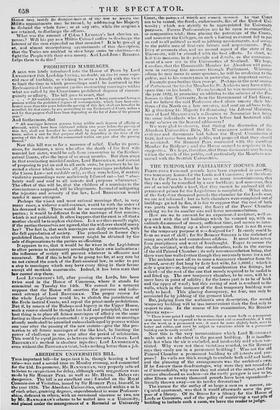PROHIBITED MARRIAGES.
A ems was lately introdueed into the House of Peers by Lord Memo VAST (his Lordship having, no doubt, an eye to some espe- cial ease of hardship, or wishing to serve a friend) with the view to limit the time in which proceedings could be instituted in the Ecclesiastical Courts against reifies contracting marriages within what are called by the Churchmen prohibited degrees of consan- guinity or affinity. The bill goes to enact, that
. . . " All voidable marriages, in oonsequenee of being contracted betwem persons within the prohibited lipees of consanguinity, which have been cele- brated more than two years before the passing of this Act, shall not hereafter be annulled, for that cause, by any proceeding in any Ecelesiastierl Court, unless suit for that purpose shall have been depeuding on the 1st of June of the present year."
And furthermore, that
" All marriages between persons being within such degrees of affinity as . aforesaid, which have been celebrated within two years before the pa.sing of this Act, shall not !terraint be annulled, by any such proceeding or stn Vence, unless a suit for that purpose shall be depending at the time of the passing of this Act, or shall be commenced within one year after the passing thereof."
Now this bill was so far a measure of relief. Under its provi- sions, for instance, a man who after the death sf his first wail married her sister, would he safe from prosecution in the Ecclesi- astical Courts, after the lapse of so many months. But then steps in that everlasting mischief-maker, Lord BROUGHAM, and instead of proposing to put an end to all such suits, he procures to be in- serted a clause which renders all future mart iages prohibited by the Canon Law—not voidable only, as they were before, if certain vindictive proceedings were maliciously followed out—but " abso- lutely null and void to all intents and purposes whatsoever.- The effect of this will be, that the children of a marriage in the circumstances supposed. will be illegitimate. Instead of mitigating the injustice and severity of the law, Lord BROUGHAM would render it more stringent. Perhaps the wisest and most rational marriage that, in very many cases, a widower could contract, would be with the sister (of his deceased wife. There would be no consanguinity in the two parties; it would be different frim the marriage of first cousin:, which is not prohibited. It often happens that the aunt is till that a mother should be to orphan children. Is it not then morally right, if the parties themselves are agreed, that the widower should many her? The fact is, that such marriages are daily contracted, with the full approbation of society. The priesthood in former days prohibited them, in order that money might be obtained by the sale of dispensations to the parties so offending. It appears to us. that it would be far wiser in the Legislature to allow persons to intermarry according to their own inclinations: the influence of society will prevent whatever is offensive and unnatural. But if this is held to be going too far, at any rate let us not extend the reach of the Ecclesiastical law, in order to put a stop to marriages which may have every thing in their favour except old monkish enactments. Indeed, it has been seen that law cannot stop them. Lind LYNDHURSTS bill, after passing the Lords, has been twice read in the House of Commons, where it stands fur committal on Tuesday the 19th. We cannot for a moment suppose that the House will sanction the perverse and iodis- creel attempt of Lord BROUGHAM. The proper course for the whole Legislature would be, to abolish the jurisdiction of the Ecclesiastical Courts, and repeal the priest-made prohibitions. But if, by reason of the Bishops and bigotry in the Upper House, such a course should be thought too bold and principled, the next best thing is to place all future marriages of affinity on the same footing as those already contracted : it is proposed that no marriage already made shall be annulled unless challenged by process within one sear after the passing of the new statute—give the like pro- tection to all future marriages of the like kind, by limiting the power of challenge to one year after the period of celebration. This would be equal justice, as between the two sets of cases. Lord BROUGHAM S method is absolute injustice; Lord LYNDHURST'S, even without the BROUGHAM taint, looks nothing better than a job.


























 Previous page
Previous page